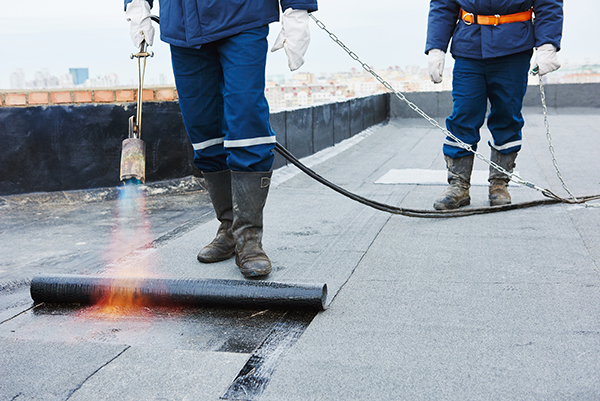About Us
Advanced Roofing Technologies, your dependable partner for durable, efficient, and affordable flat roofing solutions. Protecting your home, one roof at a time.
Instant Quote Instant QuoteContact Info
- 950 W Venango Street
Philadelphia PA 19140 - 267-277-2124
- [email protected]
- Week Days: 09.00 to 18.00
Sunday: Closed
Modified Bitumen Roofing
- Services
- Modified Bitumen Roofing

Modified bitumen roofing membrane is a type of roofing material that combines the durability of asphalt with the flexibility of rubber. It is commonly used in low-slope and flat roof applications due to its excellent weather resistance and long-lasting performance.
Modified bitumen membranes are composed of bitumen, a sticky and viscous form of petroleum, which is modified with polymers to enhance its properties. The polymers provide added elasticity, strength, and resistance to temperature extremes, making the membrane more flexible and durable.
One of the key advantages of modified bitumen roofing membranes is their excellent resistance to UV radiation, weathering, and thermal shock. They can withstand extreme temperature fluctuations without cracking or becoming brittle, ensuring long-term performance in various climates.
Modified bitumen membranes also provide superior waterproofing capabilities, protecting the underlying structure from water infiltration. They have multiple layers, including a base layer, reinforcement layer, and top surfacing, which enhances their durability and resistance to punctures and tears.
Installation of modified bitumen membranes requires professional expertise. The membranes are typically rolled out onto the roof and adhered using hot asphalt, cold adhesives, or heat-welding techniques, depending on the specific type of membrane.
Modified bitumen roofing membranes offer a reliable and cost-effective solution for low-slope and flat roofs, providing durability, weather resistance, and excellent waterproofing capabilities.
Pros and Cons of Modified Bitumen Roofing
Consider these pros and cons of modified bitumen roofing, along with other project-specific factors, when deciding on a roofing system. Consulting with Advanced Roofing Technologies provides further insights and help determine if modified bitumen roofing is the right choice for your specific needs.
| Pros | Cons |
|---|---|
| Durability: Modified bitumen roofs are highly durable and can withstand harsh weather conditions, including high winds, heavy rain, and extreme temperatures. They have excellent resistance to UV radiation, which helps prevent deterioration and prolongs the lifespan of the roof. | Vulnerability to Ponding Water: Modified bitumen roofs are susceptible to damage from ponding water if proper drainage is not maintained. Ponding water can lead to accelerated aging and deterioration of the roofing system. Regular inspections and maintenance are necessary to prevent ponding and ensure proper water runoff. |
| Flexibility: Modified bitumen membranes offer excellent flexibility, allowing them to accommodate building movement and temperature fluctuations without cracking or splitting. This flexibility helps maintain the integrity of the roof and reduces the risk of leaks. | Complexity of Installation: Modified bitumen roofing installation typically requires professional expertise and specialized equipment. Improper installation techniques can compromise the performance and longevity of the roof. Therefore, it's important to ensure that qualified and experienced contractors handle the installation. |
| Multiple Installation Methods: Modified bitumen roofing can be installed using various methods, including torch-applied, cold-applied, or self-adhesive techniques. This versatility allows for flexibility in installation and can be tailored to suit different project requirements. | Limited Color Options: Modified bitumen roofing materials are generally available in darker colors, such as black or gray, which can absorb heat. This may result in increased cooling costs during hot weather. However, reflective coatings can be applied to mitigate heat absorption. |
Lifespan of Modified Bitumen Roofing
The lifespan of modified bitumen roofing can vary depending on several factors, including the specific type of membrane, installation quality, maintenance practices, and environmental conditions. However, properly installed and well-maintained modified bitumen roofs can typically last between 20 to 30 years or more.
The longevity of modified bitumen roofing is attributed to its durable composition and weather-resistant properties. Modified bitumen membranes, whether APP or SBS, are designed to withstand harsh weather conditions, including UV radiation, temperature fluctuations, and heavy rain.
The lifespan of a modified bitumen roof can be influenced by factors such as the quality of installation, adherence to manufacturer guidelines, and regular maintenance. Professional installation by experienced roofing contractors is crucial for ensuring proper adhesion and seam integrity, which can significantly impact the roof's longevity.
Regular inspections and maintenance are also important for maximizing the lifespan of a modified bitumen roof. This includes routine cleaning, checking for signs of damage or wear, and promptly addressing any issues that arise.
Environmental factors such as extreme weather events, exposure to pollutants, and the overall climate of the area can also affect the lifespan of a modified bitumen roof. Severe weather conditions or lack of proper maintenance may require more frequent repairs or potentially shorten the roof's lifespan.
By following recommended maintenance practices, conducting regular inspections, and promptly addressing any repairs or issues, you can help extend the lifespan of your modified bitumen roofing system. Working with a professional roofing contractor and adhering to manufacturer guidelines for maintenance and care will ensure that your modified bitumen roof performs optimally and provides reliable protection for your building.
Types of Modified Bitumen Membranes
There are two primary types of modified bitumen membranes: APP (Atactic Polypropylene) and SBS (Styrene-Butadiene-Styrene). APP membranes are heat-welded or torch-applied, while SBS membranes can be installed using a variety of methods such as heat-welding, cold adhesive, or self-adhesive.
What Is Better Than Modified Bitumen Roofing?
The Lotus product line offers a series of high-performance coatings designed for waterproofing and protection in various applications. These products are easy to apply, weather-resistant, and have excellent adhesion properties to various surfaces, making them suitable for use on concrete, metal, wood, and different types of roofing materials. The Lotus line includes a primer, base coat, and top coat, each with specific advantages such as crack-bridging capabilities, UV resistance, and long-lasting performance.
One of the key advantages of the Lotus product line is its seamless and jointless membrane formation, ensuring long-lasting protection against water infiltration. The products are also known for their high resistance to extreme weather conditions, ranging from -30˚C to +120˚C, making them suitable for various climates. Additionally, their UV resistance helps maintain their performance and appearance even with prolonged exposure to sunlight.
While modified bitumen roofing may be slightly more cost-effective, the Lotus product line stands out for its advanced formulations and ease of repair. It has received positive feedback worldwide for over 15 years, indicating its durability and reliability. However, the choice between the two depends on specific project requirements, budget constraints, and the preferences of roofing professionals or contractors.

